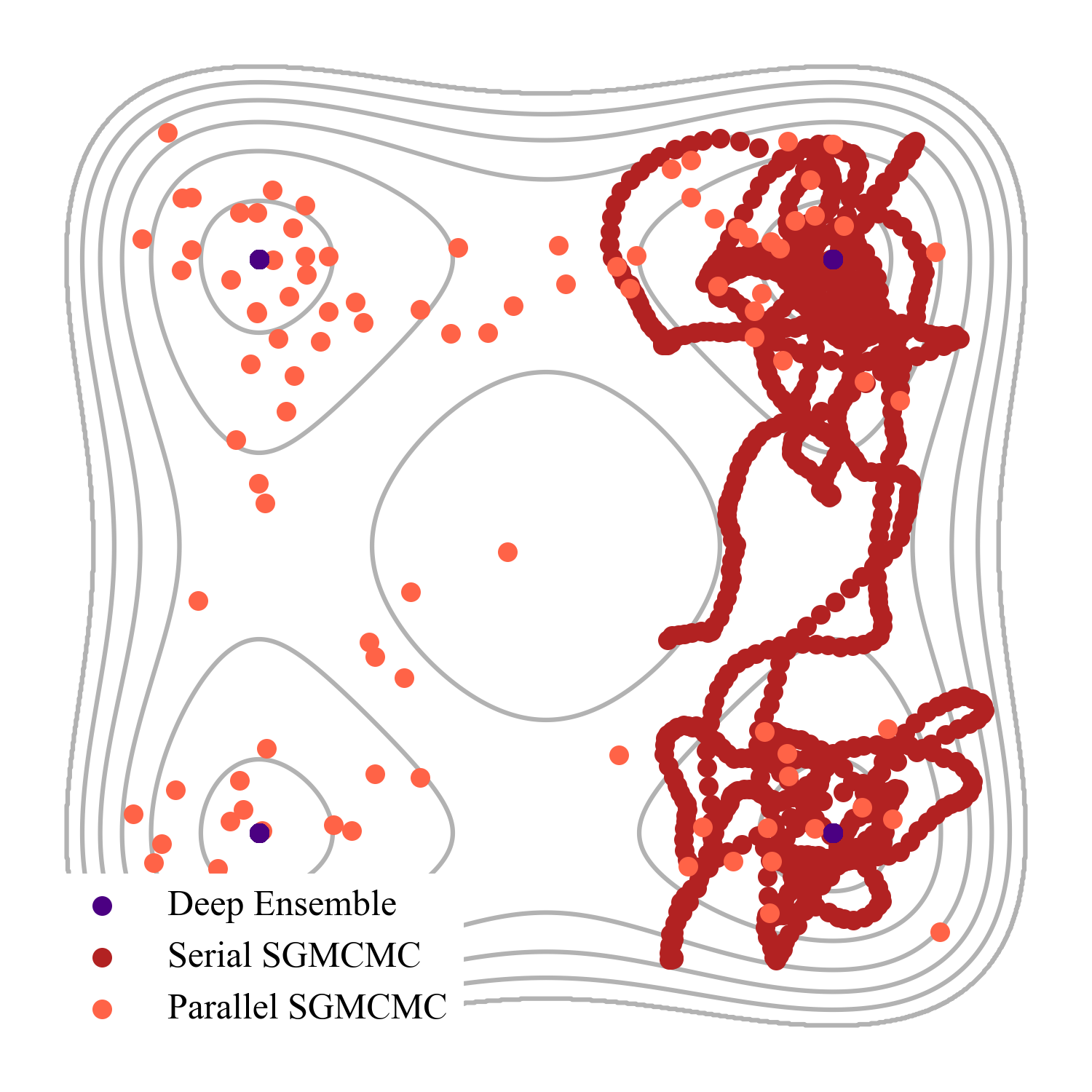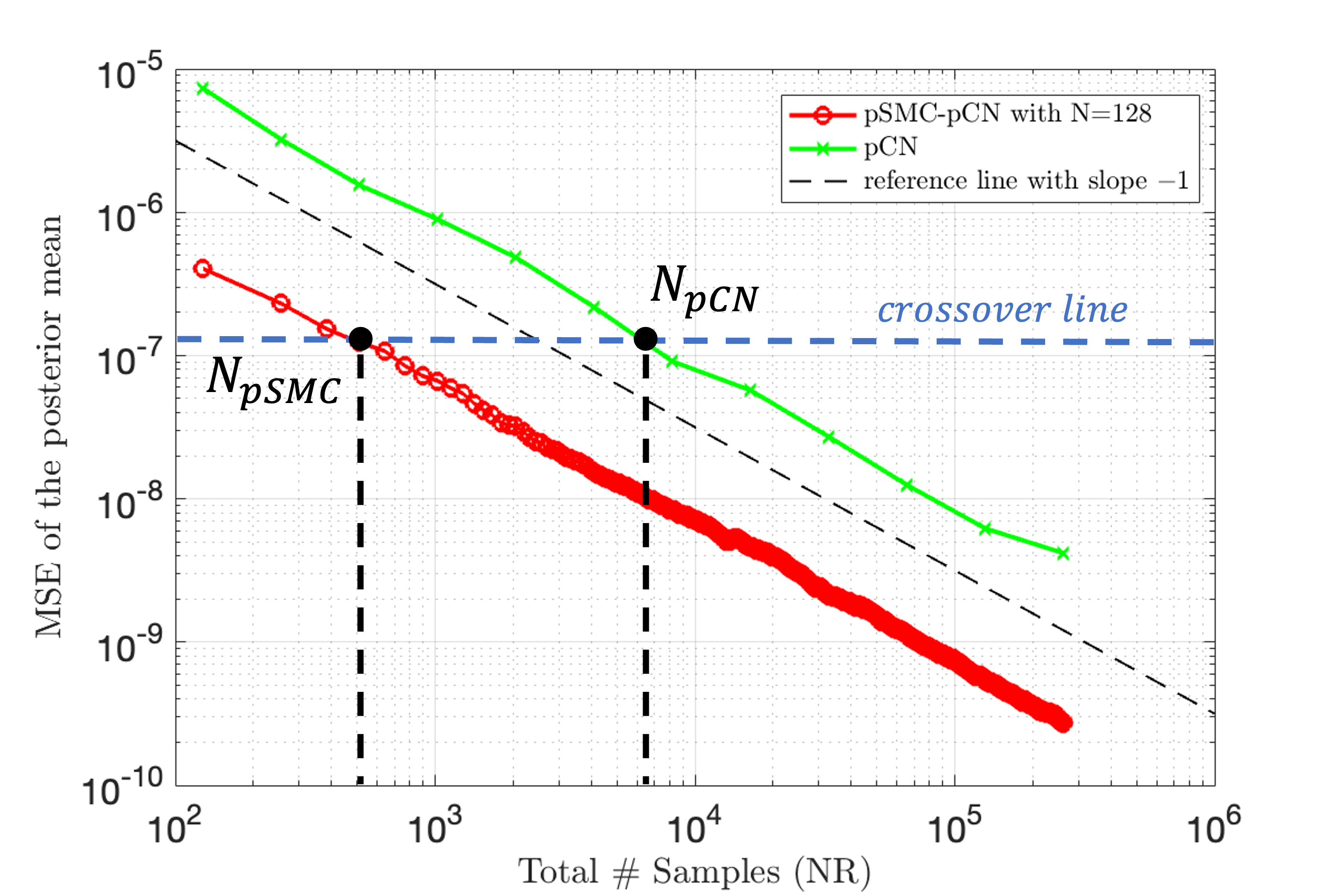Scalable Monte Carlo for Bayesian Learning

0
🔍
Sign in to get full access
Overview
- This paper introduces a scalable Monte Carlo method for Bayesian learning that can handle large datasets and complex models.
- It builds on Scalable Bayesian Learning of Posterior Distributions and SMC is All You Need: Parallel Strong Scaling for MCMC.
- The method uses Markov Chain Monte Carlo (MCMC) and Sequential Monte Carlo (SMC) techniques to efficiently explore the parameter space and estimate the posterior distribution.
- It also incorporates multilevel sampling to improve convergence and stochastic gradient Markov Chain Monte Carlo (SG-MCMC) to handle large datasets.
Plain English Explanation
The paper presents a new way to do Bayesian learning, which is a statistical technique used to make predictions and decisions based on data. Bayesian learning can be computationally expensive, especially when dealing with large datasets or complex models.
The researchers developed a method that combines several advanced techniques to make Bayesian learning more scalable and efficient. They use Markov Chain Monte Carlo (MCMC) and Sequential Monte Carlo (SMC) algorithms to explore the parameter space and estimate the posterior distribution, which represents the uncertainty in the model's parameters given the observed data.
To further improve the method's performance, the researchers incorporate multilevel sampling, which helps the algorithms converge faster, and stochastic gradient MCMC, which allows them to handle large datasets more efficiently.
The end result is a scalable and flexible Bayesian learning approach that can be applied to a wide range of problems, from predicting the weather to analyzing genetic data. By making Bayesian learning more accessible, this work has the potential to unlock new insights and improve decision-making across many fields.
Technical Explanation
The paper presents a scalable Bayesian learning method that combines MCMC and SMC techniques to efficiently explore the parameter space and estimate the posterior distribution.
The key elements of the method include:
-
MCMC and SMC integration: The researchers integrate MCMC and SMC algorithms to leverage the strengths of both approaches. MCMC is used to generate samples from the posterior distribution, while SMC is used to adaptively update the proposal distribution and estimate the marginal likelihood.
-
Multilevel sampling: The method incorporates multilevel sampling to improve the convergence of the MCMC algorithm by targeting the posterior distribution at multiple levels of approximation.
-
Stochastic gradient MCMC: To handle large datasets, the researchers use stochastic gradient MCMC techniques, which update the MCMC algorithm using noisy gradients computed on subsets of the data.
The researchers demonstrate the effectiveness of their approach on several benchmark problems, including Bayesian logistic regression and Bayesian neural networks. They show that the method can achieve significant computational speedups compared to traditional Bayesian learning techniques, while maintaining accuracy.
Critical Analysis
The paper presents a well-designed and thorough investigation of the proposed scalable Bayesian learning method. The researchers have carefully integrated several state-of-the-art techniques, such as MCMC, SMC, multilevel sampling, and stochastic gradient MCMC, to address the challenges of scalability and efficiency in Bayesian learning.
One potential limitation of the method is its reliance on specific assumptions, such as the availability of gradients or the ability to construct suitable proposal distributions. In more complex models or scenarios where these assumptions do not hold, the performance of the method may degrade. The authors acknowledge this and suggest potential avenues for future research to address these challenges.
Additionally, while the paper demonstrates the method's effectiveness on several benchmark problems, it would be valuable to see its performance on a wider range of real-world applications, including those with high-dimensional parameter spaces or non-standard likelihood functions. This could provide further insights into the method's strengths, limitations, and potential areas for improvement.
Overall, the paper presents a significant contribution to the field of Bayesian learning and offers a promising approach for making these powerful techniques more accessible and scalable for practitioners.
Conclusion
This paper introduces a scalable Monte Carlo method for Bayesian learning that combines MCMC, SMC, multilevel sampling, and stochastic gradient MCMC techniques. The proposed approach can handle large datasets and complex models, making Bayesian learning more accessible and applicable to a wide range of practical problems.
By addressing the scalability and efficiency challenges in Bayesian learning, this work has the potential to unlock new insights and improve decision-making across various domains, from weather forecasting to personalized medicine. The researchers have demonstrated the effectiveness of their method on several benchmark problems, and the critical analysis suggests promising avenues for further research and real-world applications.
This summary was produced with help from an AI and may contain inaccuracies - check out the links to read the original source documents!
Related Papers
🔍

0
Scalable Monte Carlo for Bayesian Learning
Paul Fearnhead, Christopher Nemeth, Chris J. Oates, Chris Sherlock
This book aims to provide a graduate-level introduction to advanced topics in Markov chain Monte Carlo (MCMC) algorithms, as applied broadly in the Bayesian computational context. Most, if not all of these topics (stochastic gradient MCMC, non-reversible MCMC, continuous time MCMC, and new techniques for convergence assessment) have emerged as recently as the last decade, and have driven substantial recent practical and theoretical advances in the field. A particular focus is on methods that are scalable with respect to either the amount of data, or the data dimension, motivated by the emerging high-priority application areas in machine learning and AI.
Read more7/18/2024


0
Scalable Bayesian Learning with posteriors
Samuel Duffield, Kaelan Donatella, Johnathan Chiu, Phoebe Klett, Daniel Simpson
Although theoretically compelling, Bayesian learning with modern machine learning models is computationally challenging since it requires approximating a high dimensional posterior distribution. In this work, we (i) introduce posteriors, an easily extensible PyTorch library hosting general-purpose implementations making Bayesian learning accessible and scalable to large data and parameter regimes; (ii) present a tempered framing of stochastic gradient Markov chain Monte Carlo, as implemented in posteriors, that transitions seamlessly into optimization and unveils a minor modification to deep ensembles to ensure they are asymptotically unbiased for the Bayesian posterior, and (iii) demonstrate and compare the utility of Bayesian approximations through experiments including an investigation into the cold posterior effect and applications with large language models.
Read more6/4/2024


0
SMC Is All You Need: Parallel Strong Scaling
Xinzhu Liang, Joseph M. Lukens, Sanjaya Lohani, Brian T. Kirby, Thomas A. Searles, Kody J. H. Law
The Bayesian posterior distribution can only be evaluated up-to a constant of proportionality, which makes simulation and consistent estimation challenging. Classical consistent Bayesian methods such as sequential Monte Carlo (SMC) and Markov chain Monte Carlo (MCMC) have unbounded time complexity requirements. We develop a fully parallel sequential Monte Carlo (pSMC) method which provably delivers parallel strong scaling, i.e. the time complexity (and per-node memory) remains bounded if the number of asynchronous processes is allowed to grow. More precisely, the pSMC has a theoretical convergence rate of Mean Square Error (MSE)$ = O(1/NP)$, where $N$ denotes the number of communicating samples in each processor and $P$ denotes the number of processors. In particular, for suitably-large problem-dependent $N$, as $P rightarrow infty$ the method converges to infinitesimal accuracy MSE$=O(varepsilon^2)$ with a fixed finite time-complexity Cost$=O(1)$ and with no efficiency leakage, i.e. computational complexity Cost$=O(varepsilon^{-2})$. A number of Bayesian inference problems are taken into consideration to compare the pSMC and MCMC methods.
Read more6/4/2024


0
A Bayesian Optimization through Sequential Monte Carlo and Statistical Physics-Inspired Techniques
Anton Lebedev, Thomas Warford, M. Emre c{S}ahin
In this paper, we propose an approach for an application of Bayesian optimization using Sequential Monte Carlo (SMC) and concepts from the statistical physics of classical systems. Our method leverages the power of modern machine learning libraries such as NumPyro and JAX, allowing us to perform Bayesian optimization on multiple platforms, including CPUs, GPUs, TPUs, and in parallel. Our approach enables a low entry level for exploration of the methods while maintaining high performance. We present a promising direction for developing more efficient and effective techniques for a wide range of optimization problems in diverse fields.
Read more9/6/2024